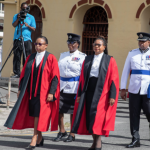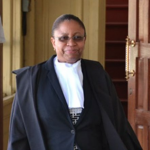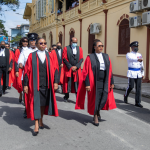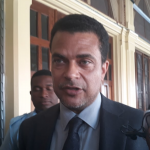
The Opposition’s lead attorney, Senior Counsel Roysdale Forde, has asked the High Court to order President Irfaan Ali to initiate consultation with the Leader of the Opposition, Aubrey Norton on the appointments of the Chancellor and Chief Justice within two months.
However, Guyana’s Attorney General, Senior Counsel Anil Nandall has objected to request, stating that there are no timeline provisions in the Constitution surrounding the appointment of the top judicial officers.
The arguments were laid before Justice Damone Younge on Wednesday.
She is presiding over the case brought by APNU+AFC Member of Parliament Vinceroy Jordan, which is challenging the President’s non appointment of a Chancellor and Chief Justice.
The Opposition MP has asked the Court to declare that since assuming Office, President Irfaan Ali has failed to engage the Leader of the Opposition on the appointment of the Chancellor and Chief Justice in accordance with Article 127 of the Constitution.
In presenting his oral arguments on Wednesday, Jordan’s Attorney, Roysdale Forde, said the evidence before the Court clearly indicates that the process of consultation as required by the Constitution was never initiated by the President.
He told the court that the arguments proffered by the Attorney General that President Ali has had the least time when compared with his predecessors to comply with the constitution, is irrelevant.
He said instead of initiating the consultative process, the President between August 2020 and January 2021 made it clear that he was not going to engage the then Opposition Leader Joseph Harmon. It was argued that even after the change in leadership within the Opposition, the President has continued to ignore his Constitutional obligations.
“We respectfully submit your honour that the issues of non-recognition, the issues of shaking hands, those are completely irrelevant in relation to the obligation of the President under Article 127 of the Constitution,” Senior Counsel Forde argued.
He pointed out that after being sworn in as Leader of the Opposition in 2021, Mr Aubrey Norton, called on the President to advance the process of appointing a Chancellor and Chief Justice. Mr Norton also indicated his willingness to support the confirmation of acting Chancellor of the Judiciary, Yonette Cummings and acting Chief Justice Roxane George. There has been no response to his letter.
The Constitution requires that there must be agreement between the President and the Opposition Leader on the appointment of a Chancellor and Chief Justice.
Arguing that President Ali had more than two years to facilitate the appointments of the senior judicial officers, the Senior Counsel asked the Court to compel the President to act.
“We respectfully submit that in the circumstances, it is a clear case of the refusal by the President to initiate the process required by Article 127. There has been no reasonable excuse offered upon which the court could act and we respectfully submit that the orders be,” Mr Forde told the Court.
But the Attorney General, Senior Counsel Anil Nandlall, in objecting to the arguments put forward by Mr Forde, said though the case addresses a serious Constitutional issue, the Constitution does not set a timeframe for the appointment of the Chancellor and Chief Justice.
“There is no timeframe by which the President is bound; neither is there dependent on any antecedent occurrence to trigger that appointment…The only conditionality that affects the power of the President to appoint but it is a fundamental conditionality, is that he cannot exercise that power without an agreement from the opposition,” the Attorney General told the Court.
He said though the President had earlier indicated his unwillingness to engage Mr Harmon, the Head of State has since publicly indicated that he was ready to meet with the Opposition Leader unconditionality to consult on the appointment of various Constitutional appointments.
Nandlall said when Mr Aubrey Norton became Opposition Leader, the President engaged him on a number of other Constitutional appointments.
The Attorney General argued that it was important for the President to address appointments that were necessary to fill vacant posts such as Office of the Commissioner of Police.
He submitted that the President will engage the Opposition Leader on the Appointment of the Chancellor and Chief Justice at an appropriate time.
Since 2005, only acting appointment have occupied the seats of Chancellor and Chief Justice in Guyana.











You must be logged in to post a comment Login